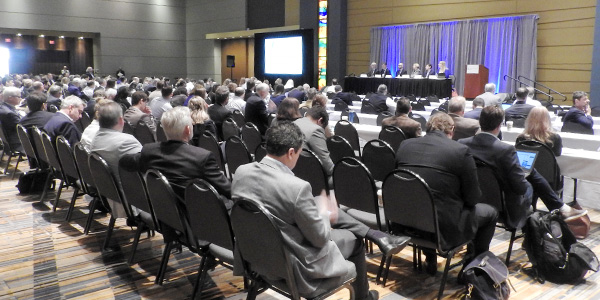By Michael Kuser
HARTFORD, Conn. — FERC blurred the line between state and federal oversight over power issues last month when it rejected multiple requests to reconsider its landmark electric storage order, Commissioner Bernard McNamee told the New England Conference of Public Utilities Commissioners (NECPUC) at its 72nd annual symposium Tuesday.
The May ruling prompted a partial dissent from McNamee over the commission’s rejection of requests to allow states to opt out of rules giving FERC jurisdiction over storage resources connected to utility distribution systems (Order No. 841-A). (See FERC Upholds Electric Storage Order.)
“I dissented partially from this order because I felt that for behind-the-meter storage resources and those resources that are connected at the distribution system, FERC exceeded its authority,” McNamee said.
The Federal Power Act took a two-pronged approach, giving FERC authority to make decisions about the transmission of electric energy in interstate commerce and the sale of electricity at wholesale, while also recognizing states’ jurisdiction over generation and distribution facilities, he said.
“The majority of the commission reasoned that because energy resources would affect wholesale prices, FERC had jurisdiction to tell the states that they had to allow energy storage facilities to connect at the distribution level and, by the way, saying, ‘You figure out the safety issues,’” McNamee said. “I fundamentally thought that was exceeding our authority.
“Where is the line between the states and the federal government on these issues?” he continued. “What’s the policy about this? What do the parties say of this? What is the legal thinking from the parties about this? I’m trying to decipher that.”
Issued in February 2018, FERC Order 841 set a Dec. 3, 2019, deadline for RTOs to comply with the directive to allow storage resources to provide any services of which they are capable. The commission in February approved FERC Accepts ISO-NE Storage Tariff Revisions.)
Utility-scale or not
The anticipated rapid growth of storage was a hot topic at the conference, with ISO-NE last month confronting 2,500 MW of storage resources in its queue, compared with 1,381 MW just a month earlier. (See ‘Grid Transformation Day’ Highlights ISO-NE Challenges.)
“Our interconnection queue doesn’t mean all those projects will get built,” said Christopher Parent, ISO-NE’s director of market development, adding that the RTO will focus on bringing storage projects into the market.
“Sometimes behind the meter, sometimes in front … our market constructs enable all storage to participate and select the services it provides,” Parent said. “It’s important to get the price signals right for the market.”
Mike Calviou, National Grid senior vice president for strategy and regulation, said his company will own and operate 25 MW/146 MWh of storage by the end of the year.
“We’re also interconnecting non-utility scale storage and have 17 MW paired with solar and 1 MW in the queue,” Calviou said.
The utility put a 6-MW/48-MWh storage facility on Nantucket to back up a diesel generator and avoid the need to build more costly transmission lines.
“We’re working with ISO-NE to maximize benefit, so you don’t just write incentives to create storage but to use it,” Calviou said.
“I think storage should be seen as part of the solution,” he said, adding that planners should not be technology-agnostic.
Jeffrey Bishop, CEO of storage developer Key Capture Energy, which has 10% of the storage in ISO-NE’s queue, said, “If the wholesale market doesn’t have the right incentives to support storage development, the states will step in and do that. Massachusetts has its Clean Peak Standard because the wholesale market doesn’t compensate for the various services that storage provides.”
Massachusetts mandates that electricity suppliers serve a certain portion of their sales with “clean peak” resources, with the state’s Department of Energy Resources each year determining the minimum standard. (See Mass. Inaugurates Clean Peak Standard.)
Lon Huber, a director at energy consultancy Navigant, cited time-of-use rates as evidence of how storage is moving from environmental value to systemwide benefit value.
Storage can respond to price signals at the peaks, Huber said, noting how fossil fuel-fired generators were unable to work in a cold snap and “should be penalized for not providing capacity when needed.”
Time-of-use rates are the tool that allow customers to shift their demand to shoulder periods, said Anne Hoskins, chief policy officer for solar developer SunRun.
“In two years, we’ve seen a dramatic increase in customer demand for storage,” yet in some ways the system is living in the past, Hoskins said. “During the wildfires there was a massive rush on generators … and it was very disconcerting to me, living in California in a fire district, to receive a notice from my utility that said ‘Be prepared for the shutoffs, and get your gasoline for your generator.’ And this is in a state where climate goals are very high, like the climate goals here.”
Connecticut Public Utilities Regulatory Authority Chair Marissa Gillett confessed that her state is one of three in the region (along with Rhode Island and Maine) that do not yet support a “bring-your-own-device” (BYOD) program.
BYOD offers utility customers rebates for installing and enrolling connected thermostats and battery energy storage devices.
“The New Hampshire public consumer advocate supported BYOD, but not my own state,” Gillett said.
Hoskins said that despite the slow start in some states, “New England is showing tremendous leadership in this area … and it takes a lot of legwork to set the tariffs.”
She noted that neighboring NYISO is also active on the issue, and that PSEG Long Island in the next couple of weeks is about to launch its own BYOD program.
(For Day 1 coverage of the NECPUC event, see New England Regulators Talk Wholesale Market Evolution.)











